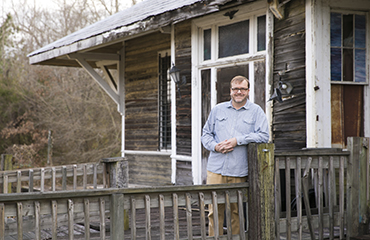
Lander University Professor of Sociology Dr. Daniel Harrison will spend the fall semester finishing Live at Jackson Station, his book about the well-known Greenwood area nightspot and its ill-fated proprietor, Gerald Jackson.
Harrison, one of two Lander faculty members granted sabbatical leave for the 2018-2019 school year, has been "chipping away" at the book since the publication of his first book, Making Sense of Marshall Ledbetter, in 2014. The work is "pretty much mapped out," he said, but there are parts of the book he "hasn't developed yet."
He became interested in the subject after learning that Widespread Panic, a band that he said was "pretty near to my heart," had played at Jackson Station during the 1980s. He soon learned that many other acts had performed there as well, including Poco; the Swimming Pool Q's; Bob Margolin; Tinsley Ellis; an early version of the Georgia Satellites; Nappy Brown; and Muddy Waters' backing band, the Legendary Blues Band.
"The musical talent that you could get there was pretty incredible," he said, which he attributed to the fact that Gerald Jackson treated musicians well. "Gerald would give you five hundred bucks, which, you know, back in the late 70s, early 80s, that was pretty good money. There was a story about a band from Sweden that came over. They brought kids, they brought wives, and Gerald put them all up in a hotel and gave food for everybody. He gave them drinks. He made them feel at home."
Another thing that made Jackson Station stand out was the variety of people who went there. "You would have debutante belles; you would have rednecks; you would have bikers; you would have gays and lesbians; you'd have college students. You had young kids all the way up to older folks."
Harrison was interested in how such a diverse group could get along. Part of the reason, he thinks, was the space inside Jackson Station, a Civil War era train depot that Jackson bought for a dollar and moved from downtown Hodges to land his family owned, at the intersection of Highway 185 and 25 North.
Another reason, he thinks, was Jackson himself. "It comes down to Gerald, and the fact that he was just very respectful of everybody," he said.
For 15 years, Jackson Station was the late-night place to be. "People went there after all the other bars shut down. Then you'd stay there until two or three or four or five," he said.
Harrison said that Jackson, a Viet Nam War veteran, and his partner, Steve Bryant, made most of their money on their "big Friday night shows. This is when people would come in from all over. They would use that to kind of get by, and then during the week it would be more low key," he said.
Towards the end of Jackson Station's 15-year run, "it almost got too big," he said.
On the night of April 7, 1991, Jackson followed a patron, Terry Daniel Stogner, into the parking lot to collect a bar tab. He was attacked with a bush ax and left for dead. Jackson survived, but he was never the same, and Jackson Station closed. He spent the remaining 19 years of his life in the V.A. Hospital in Columbia.
Stogner, who argued that he acted in self-defense, was convicted of assault and battery of a high and aggravated nature and sentenced to 10 years in prison. He served less than seven.
A remarkable thing about Jackson, according to Harrison, is that he forgave his assailant. "He really tried to make the best of the situation. He listened to music; they fashioned these special brushes for him so he could paint. It's amazing that he survived."
Harrison never spoke with Jackson, who died in 2010, or Bryant, who died two years later, but he did interview about 30 other people, including Bryant's mother; Widespread Panic's bassist Dave Schools; and Donalds resident Daniel Prince, who bought Jackson Station in 2016 in hopes of eventually reopening it for business.
Initially, it was hard for Harrison to believe that bands like Widespread Panic had played an out-of-the-way place like Jackson Station. He understands the attraction better now. "Jackson Station was in the middle of nowhere but sort of on the road to everywhere. It didn't take too much finagling to get there, and for five hundred bucks and some good cheeseburgers and all the beer you could drink and coffee and everything else, it wasn't a bad little gig at all, and I think it's a pretty interesting story."